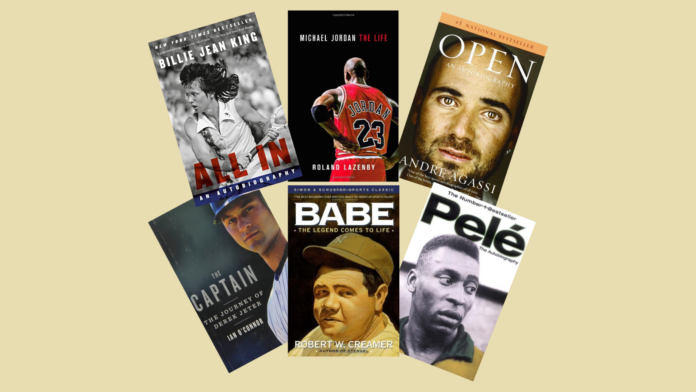Say what you will about athletes writing books, but if it says ’11x All-star, Olympic World Champion, 4x league MVP’ on the cover, it’s probably not worth reading.
Maybe that’s generalizing a bit too much, maybe there are exceptions, but I think I’m onto something here.
The first autobiography I ever read was 99: Stories of the Game by Wayne Gretzky. I picked it up at the annual book sale in the St. Vital Mall in Winnipeg, M.B. Being relatively young at the time, it sparked my interest being that it was written by statistically the best hockey player of all time.
It hooked me. It wasn’t host to the deepest of revelations, but it lived up to its title of ‘stories of the game’ and shared insight into a very different era of professional hockey.
This led me to read both Gordie Howe’s book, Mr. Hockey, and Orr: My Story by Bobby Orr.
As you can see, I stuck to what I knew, the sport of hockey. Understandable, given that I was only around ten years old and hockey is what I knew best.
Flash forward to the spring of 2019. I’m unsure of my future in hockey. I’ve gone from reading 50 books a year as a child to the few I read for English class. It’s been years since I’ve touched an autobiography. I’m wandering through my high school library and I think to myself: ‘Hey, I used to really like sports autobiographies, maybe I’ll look for one of those.’
That’s where I found it. Open.
Hands down, the best autobiography I have ever read and is tied for first place as one of my favourite books of all time.
I had no idea who Andre Agassi was. The former world number one’s tennis career ended in 2006, just three years after I was born. At first I thought, maybe this book is just super relatable for me because I’m having trouble with my sport, I’ve had thoughts of quitting this year, I’ve had trouble with my father when it comes to sport, just like Andre.
But, no. I’ve since re-read the book three to four times and no matter what era of my life I am in, there are a few striking elements.
Firstly, although the back of the book may shed light on the incredible talent that Andre Agassi was, the title speaks to none of that. A play on the word open, as tennis tournaments are most frequently called ‘opens,’ for example the Australian, U.S., and Miami Open, it also refers to the incredible depth and vulnerability displayed in the book.
Not to mention the incredible detail in which every tennis match was described, it made one feel like they were there. During the pandemic, I read it for a second time and even found a few of the matches on YouTube, to watch them as Agassi described what he was feeling during those moments in his book.
It perfectly portrays the ups and downs of sport and somehow made a then-16-year-old hockey player playing in the 2010s relate to an Olympic tennis world champion playing in the 90s and early 2000s.
Of course, reading such a vulnerable account of one’s life in sport made me interested in reading other player’s autobiographies.
Pete Sampras, Andre Agassi’s rival, wrote A Champion’s Mind (red flag in the title…). Snoozeville.
Chris Bosh, who, according to his book cover is a 2x NBA champion and 11x All-star, wrote Letters to a Young Athlete. Couldn’t finish it.
And here’s why: I’m not taking away from anyone being a Grand Slam winner, a Stanley Cup Champion, or an NBA All-Star. But as impressive as those feats are, the truth is, they’re not the only champions. So what makes them special? What can they tell us about being a champion that we haven’t already heard?
Chris Bosh is a major name in basketball, but unfortunately, I am not a major basketball fan. I had no idea who he was, and here I am being preached at to “work hard and it’ll all work out” over and over, by someone who’s had no impact on my life and I can’t relate to in the slightest.
I may not be a basketball fan, but I absolutely loved The Last Dance documentary about the Chicago Bulls dynasty. I liked the Dream Team movie about Team USA’s 1992 basketball team, too. Both of these painted a picture and helped me to understand the relevance and special feeling surrounding the events and those players. The same can be said of Agassi’s book, where I could feel the intensity of not only the matches, but the conflict in relationships and in his own mind.
While it may be harder to encompass in a book, the athletes who focus on the story, and not the accomplishments, shine through.
I read another autobiography by ‘dream team’ member Charles Barkley, called Who’s Afraid of a Large Black Man? Now that title will grab your attention. I really enjoyed it and it offered me a ton of new perspectives that I am really grateful to have learned, especially as a white woman.
Up next for me, I have a very long list of sports autobiographies I’d like to read, but here are a few.
All In: An Autobiography by Billie Jean King, a trailblazer in women’s sport and a true inspiration to me.
Bravey: Chasing Dreams, Befriending Pain, and Other Big Ideas by Alexi Pappas. What does ‘Bravey’ mean? Is it a nickname, did she have to be brave in the face of controversy or struggle? The power of a title, people! And the Olympic tattoo on her arm is enough for the cover to tell you she is an elite athlete, without needing to rub it in your face.
Lastly, my most recently acquired (thank you, Mom) autobiography, Undisputed by Donovan Bailey. Let’s see how well those sprinters can write!

